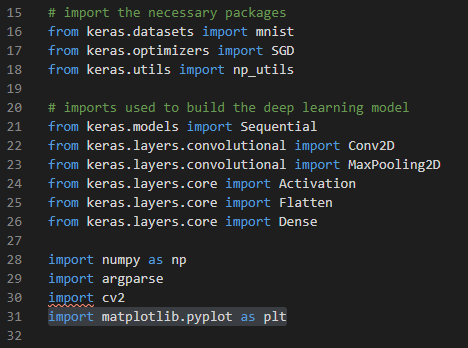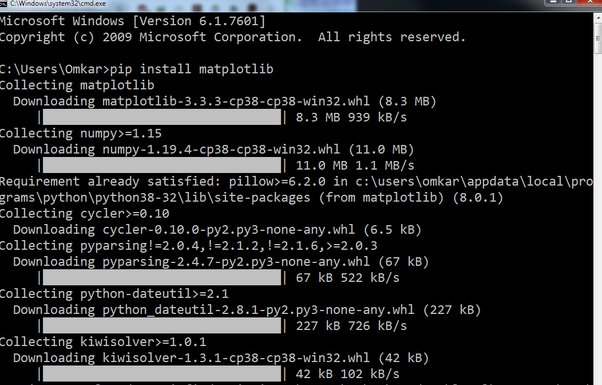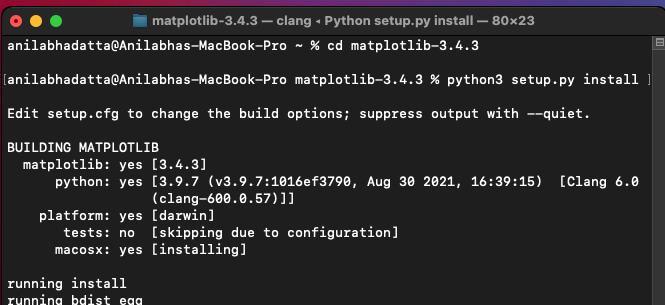How do I import matplotlib in Python?
How do I import matplotlib in Python?

I'd be happy to help you with that!
Importing matplotlib in Python is a straightforward process, and I'll guide you through it step by step.

Method 1: Installing using pip (Recommended)
The easiest way to install matplotlib is to use the Python package manager, pip. Here's how:
matplotlib package: Type the following command and press Enter:
pip install matplotlib
This will download and install the latest version of matplotlib and its dependencies.
Method 2: Using conda (if you're using Anaconda)

If you have Anaconda installed, you can use the conda package manager to install matplotlib. Here's how:
conda activate
This will switch you into the default Anaconda environment (if it exists).
Installmatplotlib using conda: Type:
conda install matplotlib
Verifying the installation
After installing matplotlib, let's verify that everything went smoothly:
matplotlib: Type:
import matplotlib.pyplot as plt
If you don't see any errors or warnings, it means that matplotlib has been successfully installed!
Now, you can use various features of matplotlib, such as plotting data, creating charts, and more! For example:
plt.plot([1, 2, 3, 4, 5])plt.show()
This code will create a simple line plot with the values [1, 2, 3, 4, 5] on the x-axis.
In conclusion, installing matplotlib is a relatively straightforward process. If you're having trouble, make sure that pip or conda (depending on your setup) is properly configured and running smoothly.
I hope this helps! Let me know if you have any questions.
How to plot in Python using matplotlib?
I'd be happy to help!
Python's popular data visualization library is called matplotlib. It provides an object-oriented API for embedding plots into applications using general-purpose GUI toolkits like Tkinter (native) or wxPython (cross-platform), or for display as standalone plots, and embedding them in PDF, PS, JPEG, TIFF, and PNG files.
To plot in Python using matplotlib, you'll need to:
1. Install matplotlib
You can install it using pip:
pip install matplotlib
2. Import matplotlib
In your Python script or Jupyter notebook, import matplotlib:
import matplotlib.pyplot as plt
This allows you to use the plt alias for the matplotlib functions.
3. Create a figure and axis
Create a figure and an axis using the following code:
fig, ax = plt.subplots()
The subplots() function creates a figure with one set of subplots (i.e., it's like creating a single plot).
4. Plot your data
Use various matplotlib functions to create plots based on your data:
For a simple line plot:ax.plot(x, y) x is the x-axis values y is the corresponding y-axis values For a scatter plot: ax.scatter(x, y) For a bar chart: ax.bar(x, y) For a histogram: ax.hist(data, bins=50)
Replace x, y, and data with your actual data.
5. Customize your plot
You can customize the appearance of your plot using various options:
Set labels for the axes:ax.set_xlabel('X-axis') and ax.set_ylabel('Y-axis') Add a title: ax.set_title('My Plot') Change the line style, color, or marker: ax.plot(x, y, 'ro-')
Replace 'ro-' with your desired line style (e.g., 'r' for red dots).
6. Show your plot
Use plt.show() to display the plot:
plt.show()
This will render the plot in a new window.
Example Code: Simple Line Plot
Here's an example code snippet:
import matplotlib.pyplot as plt Data for the x-axis and y-axisx = [1, 2, 3, 4, 5]
y = [2, 4, 6, 8, 10]
Create a figure and axisfig, ax = plt.subplots()
Plot the dataax.plot(x, y)
Set labels for the axesax.set_xlabel('X-axis')
ax.set_ylabel('Y-axis')
Add a titleax.set_title('My Simple Line Plot')
Show the plotplt.show()
When you run this code, it will create and display a simple line plot with the given data.
Remember to explore matplotlib's extensive documentation (https://matplotlib.org/) for more advanced plotting techniques and customization options.





























